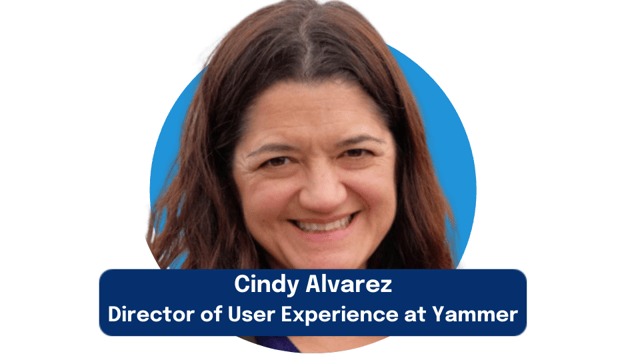Customer Development is Product Management

Cindy Alvarez, Director of User Experience at Yammer (a Microsoft company), shares how she advocated for Lean methodologies at her organization and how to gain meaningful insights from customer interviews.
Microsoft acquired Yammer, where Cindy Alvarez was Director of User Experience, in large part because of Yammer’s expertise in data-driven product development. As Microsoft’s CEO, Satya Nadella, re-focused the company’s strategy on meeting customer needs using data to make decisions, Cindy was tasked with spreading Lean methodology throughout the organization.
In this episode, Cindy shares how she’s overcome the challenges of applying Lean innovation in a large organization and how to get reliable insights from customer interviews.
Cindy takes a Lean approach to encourage teams at Microsoft to practice Lean. “A lot of what I do is customer development for customer development”, she said. Her first experiment was to simply “camp out” at Microsoft’s office in Redmund, California and invite people to come by and chat. This enabled her to learn what people are trying to accomplish, what they know and don’t know and what’s preventing them from practicing Lean.
One of the thing that Cindy learned was that employees often need to deal with skepticism from coworkers and managers about the outcomes of customer interviews. This is a challenge that’s more common in large companies than it is in startups.
“Startups are accustomed to uncertainty. It’s not that hard to sell your colleagues in a startup on the fact that ‘we’re going to talk to a bunch of people and we’re not really sure what we’re going to learn.’ Everyone’s ok with that because the kind of people who join startups are ok with that. But in a large company, we’ve allowed ourselves to create this fiction of predictability. And it is fiction because competitors come out of nowhere, technology keeps changing -- we can’t really predict what’s going to happen next year, but we kind of think we can. And so the notion of going on these interviews and saying ‘well, we’re not really sure what we’re going to learn’, that’s very jarring to people.”
To overcome this hurdle, Cindy encourages product managers to simply get started on a small scale. Here's how she encourages people at her company to do so:
“[To] people inside large companies who are struggling with this, I’ll say ‘you might want to just do some interviews guerilla style and then come tell everyone what you learned, versus saying ‘we’re going to do this’ or ‘we’re going to get buy-in for it’, just do it. And then find some interesting stuff and kind of dangle it in front of your manager and say ‘hey, there’s more where this came from, we just need to keep talking to people.”
Sharing a story about how you learned something from a customer helps people understand the value of customer development. For most people, a story will be more influential than detailed explanations.
One of the most common objections to Lean and customer development is that it doesn't provide reliable feedback. It's true that customers don't always know what they want – and if you don't ask the right questions, you won't get reliable insights. Fortunately, Cindy has solutions for these objections.
In order to get unbiased, reliable, and actionable feedback when conducting customer interviews, Cindy encourages product managers to ask customers what they’re doing today rather than asking them to predict what they will do in the future. For example, ask customers to look at their calendar and say how many times they went to the gym in the past week, rather than asking how many times they plan to go in the coming week.
You’ll learn a lot from Cindy Alvarez about customer development at a large company. Here are the highlights:
- How did Cindy Alvarez advocate for Lean methodology across her organization? (6:40)
- What was the strategy behind hosting a “Lean Day” at Microsoft? (8:28)
- How is customer development practiced at a large company? (10:45)
- When conducting user research, how does Cindy Alvarez ensure that the feedback is reliable and free of bias? (16:30)

Subscribe now!
Get our new reports, case studies, podcasts, articles and events
